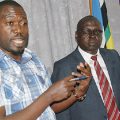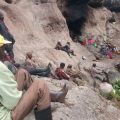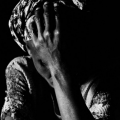Kenyan security forces evict Ogiek people from the Mau Forest Complex in the Rift Valley Region.
NAIROBI – At the foot of Kenya’s Mount Elgon on the border of Kenya and Uganda, the little-known indigenous community of Ogiek is living scattered in recently-built thatched huts and timber houses that belie not only their poverty but also the impermanence that followed their eviction by the government a year ago from their native lands on the mountain.
From a life in the forest, this community of just over 50,000 people can no longer access their land to hunt small game, gather wild fruits and medicinal herbs or practice beekeeping, as their forefathers did.
They have instead been forced to eke out a living through subsistence farming and keeping livestock – a lifestyle borrowed from agrarian communities. As such, they are unable to afford school fees and sometimes even sufficient food for their children.
The Ogiek community has been fighting a longstanding battle with the Kenyan government which claims that the evictions were necessary to conserve indigenous forests.
However, Daniel Kobei, the executive director of the Ogiek Peoples’ Development Program (OPDP), blames the evictions on the destruction of the forest by multinational companies and uncontrolled encroachment in the Mau Forest Complex. The OPDP is a Kenya-based NGO that promotes the recognition and identity of the Ogiek indigenous community and its culture.
As recently as July 2020, the Kenya Forest Service (KFS) personnel, with protection from the country’s security forces, have been driving the eviction process in defiance of a 2017 ruling of the African Court of Human and People’s Rights which recognised the Ogiek peoples’ right to their ancestral land, by evicting the community.
The community now finds itself thrust into an unfamiliar environment with their way of life grievously disrupted, making it difficult for them to cope – financially and emotionally.
Little Attention to Mental Strain of Evictions
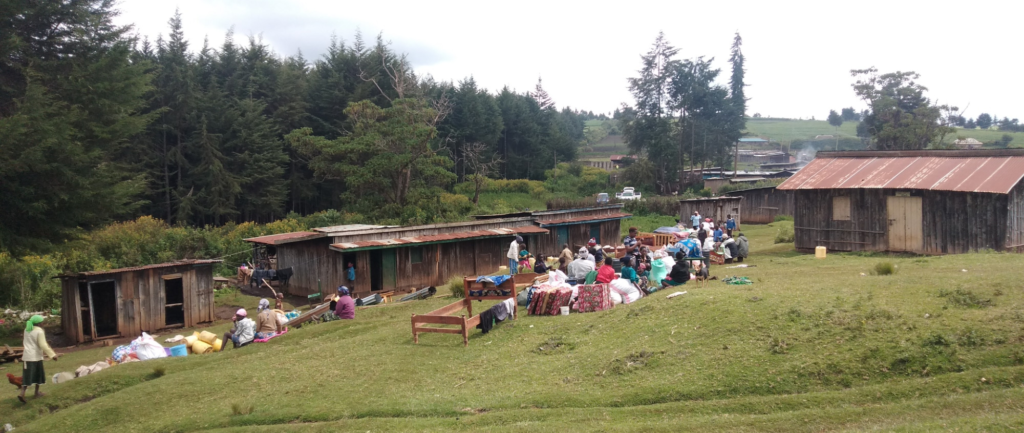
Ogiek community members ponder on what to do next following their eviction from the Mau Forest Complex by Kenyan security forces.
While some local Kenyan and international groups have protested the evictions, the stress and mental health effects of the displacement have received little attention.
“When we talk about environmental changes, we often ignore the mental aspect that comes with it,” noted Billy Rwothungeyo of the Minority Rights Group International (MRG) told Health Policy Watch.
MRG is a human rights organisation that works to secure the rights of marginalized and indigenous communities around the world. It works in 150 countries, with its Africa office based in Kampala. It has a presence in Kenya, Uganda, Cameroon, Congo, Gambia, Ethiopia, Tunisia, and Egypt.
New Global Research Initiative Examines Mental Health Stress of Indigenous Communities
The Ogiek people are part of a new research initiative that will look into the mental strain faced by indigenous communities around the world facing evictions.
Indigenous communities in East Africa, Finland, Northern Thailand and India will participate in the global research project that looks at the emotional effects of environmental changes experienced by the world’s indigenous groups.
Dubbed Land Body Ecologies Research Group, the research will involve the Ogiek, the Batwa in Uganda, the Sámi in Finland, and the Pgak’yau in Northern Thailand. Communities living in the buffer zones of the Bannerghatta National Park in India will also take part.
The two-year research project, due to start in October, will involve human rights activists, mental health researchers, scientists and artists in a bid to understand solastalgia, a phenomenon defined as the emotional or existential suffering caused by environmental change. It is also commonly described as “the feeling of homesickness while still at home.”
Funded by the Wellcome Trust Hub Award, the initiative will be led by Invisible Flock, an award-winning interactive arts studio based in London and MRG. The final project will take the form of an art exhibition in London.
“The space will be used to showcase results from the project, which will be open to the public, academics, media and other stakeholders,” explains Rwothungeyo.
“With around half of the world’s languages having no written form, art can act as a vehicle to bring forward alternative modes of expression not limited to human speech,” according to Victoria Pratt, artist and creative director of Invisible Flock in a press release
Pratt said that their approach is to tell multiple global stories at once, with the hope that through this process, solutions, answers, and meanings would be collectively conjured in the act of listening and retelling.
Indigenous Communities Continue to Lose Land.
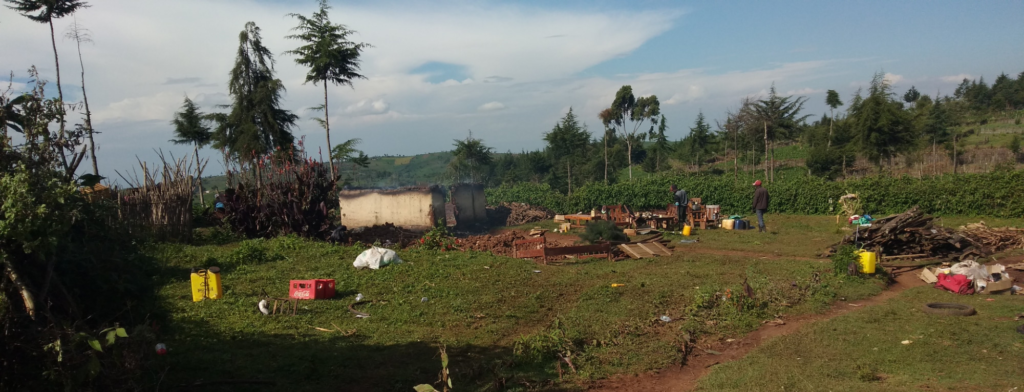
A hut belonging to one of the Ogiek community members still smouldering following evictions carried out by the Kenyan security forces.
Indigenous communities all over the world have lost and continue to lose their ancestral lands due to encroachment from other communities and state-sanctioned evictions under the guise of forest conservation. This has brought with it environmental changes, which indigenous communities have had to live with, but whose mental and psychological toll is still not well understood, hence this new research effort.
To make matters worse, the minority groups say the global call to turn 30% of the world’s surface into protected areas by 2030 will displace hundreds of millions of indigenous peoples and traditional landowners.
Through the solastalgia research, the team aims to understand the lived experiences of land trauma on marginalised and indigenous communities.
Added to the food insecurities caused by environmental changes, indigenous communities also suffer increased incidence of diseases such as malaria, malnutrition, stomach disorders and respiratory diseases.
Involve Indigenous Communities More
“This research is supposed to inform such stakeholders as government and civil society to come up with more targeted measures to help marginalized communities, who are often overlooked in public policy,” added Rwothungeyo, maintaining that the study will also shed light on how these communities are being left behind and why governments should involve them more.
The OPDP’s Kobei said that even though the core objective of the research is to understand the mental predicament of indigenous communities brought on by environmental changes, they were hopeful that a learning center for the Ogiek culture will be established, following this study.
“If you talk to a 70-year-old Ogiek about the forest they have lost, he will talk in a very emotional manner,” said Kobei. “He will tell you of the kind of honey we used to harvest in the forest that is no more, the kind of hunting we used to undertake in the forest that is no more, the kind of herbs and clean water we used to get in the forest that are no more.”
Image Credits: Ogiek Peoples Development Program.
Original Source: Healthpolicy-watch.news
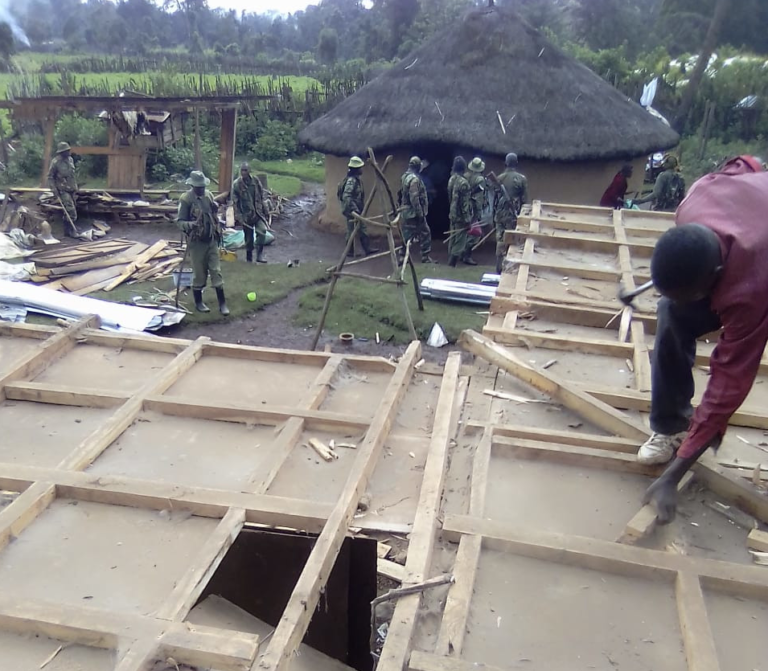

 MEDIA FOR CHANGE NETWORK1 week ago
MEDIA FOR CHANGE NETWORK1 week ago
 MEDIA FOR CHANGE NETWORK2 weeks ago
MEDIA FOR CHANGE NETWORK2 weeks ago
 FARM NEWS1 week ago
FARM NEWS1 week ago
 MEDIA FOR CHANGE NETWORK4 days ago
MEDIA FOR CHANGE NETWORK4 days ago
 MEDIA FOR CHANGE NETWORK4 days ago
MEDIA FOR CHANGE NETWORK4 days ago
 MEDIA FOR CHANGE NETWORK1 day ago
MEDIA FOR CHANGE NETWORK1 day ago



